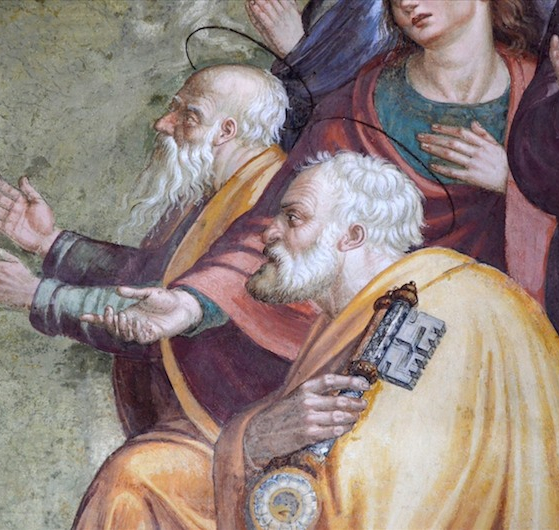
When the Nazis were rounding up Jews and sending them to death camps during World War II, most Germans shamefully did little or nothing to oppose Hitler’s government, and after the war many Jewish survivors were understandably filled with anger and hatred toward Germany. However, there were some wonderful exceptions to this truth. One survivor of the most infamous of all the death camps stated years afterwards, “I was just a boy when the Nazis put me, along with my family, into a cattle car in a city in France and started us on the long journey to Auschwitz. We had no water and we had no food, but each night the train would stop and sit still for hours. Time and time again, after hours had passed, there would be German people who would sneak out of the forest, come up to the sides of the cattle cars and push in between the slats of the car small containers of water and bits of food. Their generosity kept me alive. What they did was done at great risk; [they could have been shot or imprisoned themselves for helping us]. So—whenever I hear someone [speak] with a German accent, I say to myself, ‘Could that be the child or grandchild of one of those who dared to help me in my time of need?’ Then I smile at them” (William J. Bausch, The Story Revealed, p. 134). That is a wonderful story not only of forgiveness, but also of heroism and humanity—and it reminds us of our responsibility as Christians. Jesus is the perfect example of a love that has no limits and makes no exceptions—and if we truly wish to follow Him, this sort of love must become our rule of life.
In his Letter to the Corinthians (1 Cor 3:16-23), St. Paul uses an interesting image when he says, “Do you not know that you are the temple of God, and that the Spirit of God dwells in you?” If our souls are temples, how do we want them to appear: sloppy, untidy and disordered, and filled with spiritual filth and debris? No self-respecting person would desire that; instead, we would surely want our souls to be neat, orderly, and uncluttered, so as to be a fit dwelling place for the Holy Spirit. The readings for the Seventh Sunday in Ordinary Time speak of how to work at achieving this important spiritual goal, thereby rising above the useless, vain, and foolish values of this world. Paul urges us to set aside all worldly wisdom and boasting, and instead see ourselves as belonging only to Christ. In the Book of Leviticus (19:1-2, 17-18), the Lord God instructs His people to avoid hating one another, to take no revenge, and to cherish no grudge. Rather, we are to love our neighbor as ourselves. Jesus expands and develops this idea in the Gospel (Mt 5:38-48), for He says that we must never resist evil or injury in a way that contradicts love; being a Christian means the cycle of hatred is supposed to stop with us. Responding to hatred with hatred merely multiplies the power of evil in the world; meeting hatred with love changes this world for the better. Also, Jesus insists that if our love is genuine, it cannot be limited only to those who first love us or who treat us kindly. We must try to love everyone, without exception, and especially those who hate us—for only in this way are we truly imitating the love of our Heavenly Father.
An ancient Chinese warlord once ordered one of his generals to lead his troops to a distant city and there destroy all his enemies; the warlord was thinking in terms of the city being completely depopulated, with no survivors and no mercy being shown to any of its inhabitants. However, when he went to inspect the results a week later, he discovered his general and his troops sitting down at a banquet with the city’s residents. Furious, the warlord demanded of the general, “Did I not order you to destroy our enemies?” The general responded, “But I did—as you can see, they are now our friends” (William J. Bausch, Telling Stories, Compelling Stories, p. 98). This story perfectly aligns with and illustrates Our Lord’s teachings in the Gospel, for extending love and friendship is indeed the best way to deal with our enemies. Even when our efforts at peace and reconciliation are rejected—which, sadly, will often be the case—we ourselves will benefit spiritually, for our hearts will be more closely conformed to the Heart of Christ, and our souls will become even more beautiful as temples of the Holy Spirit.
About 100 years ago the great Catholic author and apologist G. K. Chesterton observed, “Christianity has not been tried and found wanting; it has been found difficult and not tried.” In other words, being a sincere and committed Christian isn’t easy—and the woeful state of contemporary society strongly suggests that a majority of the self-identified Christians in America today don’t truly believe, and aren’t really trying to follow, the radical and life-changing teachings of Jesus Christ. We as Catholics in particular are supposed to be salt for the earth and light for the world, profoundly affecting the people around us by our example of faith, forgiveness, and unconditional love. When this happens, miracles of grace can occur—but far too often this doesn’t happen; we let society silence and intimidate us, or distract us with the lure of pleasure and material success, or contaminate us with the false values of an “us vs. them” worldview that promotes a desire for vengeance and an indifference to the suffering of others.
If we are allowing the temples of our souls to be boarded up and defaced in such a manner, we must sincerely repent, ask for the Lord’s help, and recommit ourselves to using the gifts of the Holy Spirit which we received at Baptism and Confirmation. If we begin each day by praying, “Lord, show me what You want me to do today, and give me the courage and strength to do it,” God will help us discover the right path to follow. The life we’ve chosen for ourselves as followers of Jesus isn’t always an easy one, and it’s certainly not often appreciated and honored by today’s society, but it is the only one which offers us the assurance of eternal life in Heaven—and this must be the goal we place above everything else. Praying for our persecutors, helping those who have no actual right to our assistance, consciously choosing not to retaliate for injuries done to us, forgiving those who harm us, and loving without exception everyone we encounter, will all serve as signs to God our Father that His Son Jesus truly is our Lord and that His Holy Spirit does indeed dwell within us—and this is how we will one day come to share in the perfection of God and in the glory of His Kingdom.








